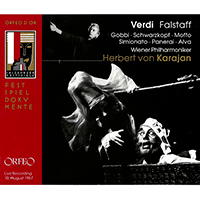Tito Gobbi
Tito Gobbi, the third of five children born to the engineer Giovanni Gobbi and his wife, began to sing while still at school, but initially put aside this interest to join the family business. In Rome however he met through his father the tenor Giulio Crimi, who agreed to take him on as a pupil. He made his operatic debut at Gubbio in 1935, with limited success, in the bass role of Count Rodolfo / La sonnambula and shortly afterwards was awarded a scholarship to study with the music staff of La Scala, Milan.
At La Scala Gobbi’s first appearance was as an understudy for the Herald in Ildebrando Pizzetti’s Orsèolo during the 1936–1937 season. His formal debut as an opera singer took place in 1937 in Rome, singing Germont père / La traviata and Rome became his base for the next few years. With the Rome Opera he sang secondary roles at first, before moving up to primary parts such as Ford / Falstaff which he sang on a company visit to Berlin in 1941. In addition he created roles in Rocca’s Monte Ivnor (1939), Malipiero’s Ecuba (1941), Persico’s La locandiera (1941) and Lualdi’s Le nozze di Haura (1943). Gobbi first sang what was to become one of his signature roles, Scarpia in Puccini’s Tosca, at Reiti in 1940, and appeared at La Scala as De Siriex / Fedora in 1941, followed more notably by Belcore / L’elisir d’amore during 1942; but his breakthrough came with his performance of the title role in Berg’s Wozzeck in its Italian premiere in Rome in November 1942.
Wartime conflict in Italy disrupted Gobbi’s career, but once hostilities had finished he began to build an international presence, appearing in Stockholm in 1947 as Rigoletto and in 1948 in concert at the Royal Opera House, London. He made his operatic debut here in 1951, as Belcore with the visiting company of La Scala; while in the previous year he had sung the title role of Don Giovanni at the Salzburg Festival under Furtwängler. At Salzburg he also sang the title roles of Falstaff (1957, under Karajan) and of Simon Boccanegra (1961). During 1953 Gobbi sang with the opera companies of Hamburg, Stuttgart and Munich, and in Barcelona and Lisbon; he also appeared frequently with the Vienna State Opera as well as at Verona and the Maggio Musicale in Florence. At La Scala he sang Ford (1952), Scarpia, Jack Rance / La fanciulla del West and Posa / Don Carlo (1958).
Gobbi’s North American debut came in 1954, as Figaro / Il barbiere di Siviglia with the Lyric Opera of Chicago, to which he was to return frequently. Two years later he first appeared at the Metropolitan Opera, New York as Scarpia. He was active at the Met until 1975 singing Falstaff, Rigoletto, Scarpia and Iago / Otello. Gobbi was particularly popular with English audiences, who responded strongly to the overt drama of his performances and his extraordinary capacity for vocal colouring. Further roles at Covent Garden, where he sang regularly until 1974, included Posa, Macbeth, Count Almaviva / Le nozze di Figaro, Michele (Il tabarro), the title role in Gianni Schicchi / Il trittico and the title role in Simon Boccanegra. This was one of his finest assumptions, in a production which he also directed (1965). He sang regularly at the Paris Opera between 1958 and 1970, notably as Scarpia opposite the Tosca of Maria Callas.
In addition to his operatic work, Gobbi had a parallel career in films, appearing in more than twenty-five from 1937 onwards. Probably the most notable of these was the highly successful British film The Glass Mountain, released in 1949. He retired from the operatic stage in 1979, but continued to be active as a stage director and teacher.
A prolific recording artist, Gobbi featured strongly (as did his brother-in-law, the bass Boris Christoff) in the wave of complete opera recordings that appeared during the 1950s with the advent of the long-playing record. He was one of the finest singing actors of his generation, whose interpretations, notably that of Baron Scarpia, have become legendary.
© Naxos Rights International Ltd. — David Patmore (A–Z of Singers, Naxos 8.558097-100).

















